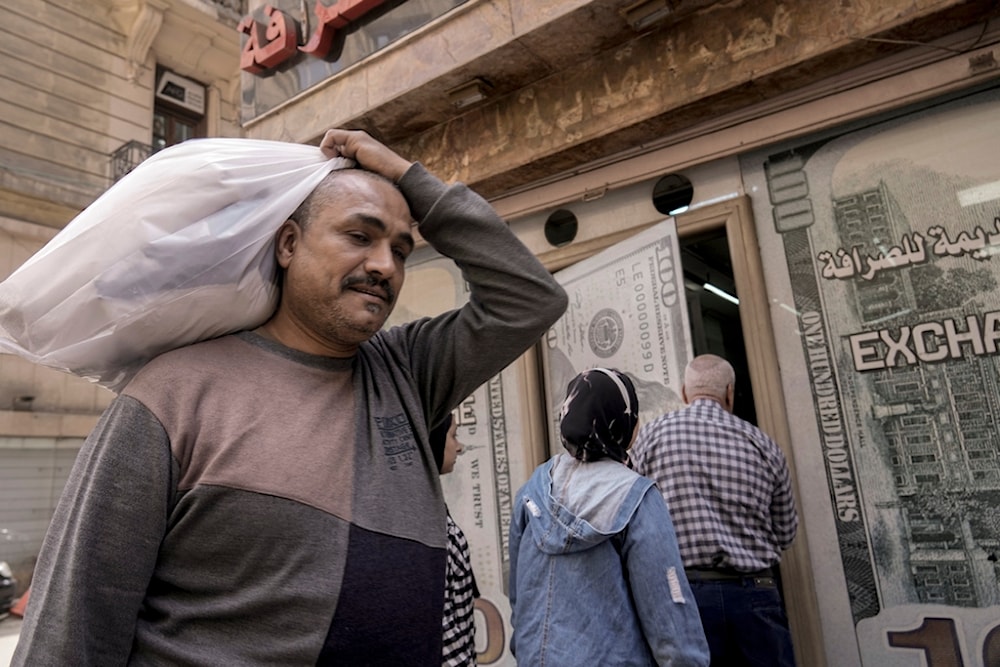Egyptian Pound in disastrous lows after Bank agrees to IMF conditions
The work of NGOs and international financial institutions such as the World Bank and the IMF have been instrumental in concealing the extreme levels of poverty that were induced as a result of neoliberal restructuration.
-

An Egyptian man walks past an exchange office in Cairo, Egypt, Wednesday, March 6, 2024 (AP)
Reuters reported on Wednesday that the Egyptian pound hit a record low against the greenback after the central bank announced that it would let the pound trade freely and induced a significant hike in interest rates by 600 basis points.
These measures to "stabilize" the economy are said to be taken with the "help" from Gulf investment and the IMF funds.
For months, Egyptian authorities had been attempting to defend a specific exchange rate level, namely 30.85 pounds to the dollar. But this morning saw the currency weaken to 50 pounds.
The IMF had imposed a more flexible exchange rate as a precondition for a deal in the making, which involves an expansion of the agency's current $3 billion support program with Egypt.
These measures were widely welcomed by analysts, Reuters says, adding that they facilitated the agreement with the fund.
A senior official who requested anonymity told the state-affiliated Al Qahera news that a deal would be finalized within a matter of hours.
In the past, Egypt has shown interest in the transition to a more adaptable exchange rate system. But whenever the pound showed signs of weakness, it would subsequently reverted to closely manging the currency.
This time, Egypt may be banking on the belief that inflows of hard currency from investment ventures, such as the $35 billion investment agreement inked with the UAE at the end of February, will forestall any steep depreciation.
Read more: Egypt's Nasserist Party calls for a hunger strike in support of Gaza
Egypt's chronic foreign currency shortage prompted the central bank to assure that its measures were supported by international partners, to ensure adequate funding for foreign exchange liquidity.
Following the announcement, Egypt's international bonds experienced a significant surge, particularly longer-dated bonds which gained approximately 4 cents before retracting slightly.
By midday, the 2049 bond rose by 2.3 cents to 83.25 cents.
Moreover, the spread between Egypt's international bonds and safe-haven US Treasuries narrowed to its lowest level since June 2021, standing at 529 basis points.
To combat rising inflation, which reached record levels last year, the central bank raised its overnight lending rate to 28.25% and its overnight deposit rate to 27.25%, intensifying monetary tightening efforts.
"To ensure a smooth transition, the CBE will continue to target inflation as its nominal anchor, allowing the exchange rate to be determined by market forces," the central bank said in a statement.
Subduing the Egypitan masses to the dollar
The work of NGOs and international financial institutions such as the World Bank and the IMF have been instrumental in concealing the extreme levels of poverty that were induced as a result of neoliberal restructuring.
The case is such in Egypt where policies of restructuration have decimated the productive capacities of the working classes by shifting the economy from industrial to merchant capitalism, plunging many into poverty.
It is worth recalling that similar policies implemented in 2007 and 2008 have resulted in disastrous outcomes for the Egyptian population.
During those years, dollar fluctuations had led to a surge in food prices which tragically resulted in fatalities among civilians waiting in bread queues.
Read more: Egyptian Muslim Brotherhood chief, 6 members sentenced to death

 3 Min Read
3 Min Read








